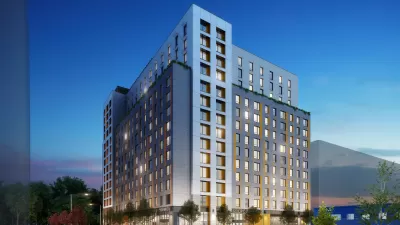Emily Badger looks at how a simple idea in energy retrofitting can be tailored to work for the largely untapped market of small to mid-size commercial properties.
There have been multiple incentive programs to assist single and multi-family residences as well as large commercial complexes in retrofitting their properties for energy efficiency. However, as Badger investigates, there is a lack of financial assistance for those who fall somewhere in the middle -- smaller commercial property owners.
"An estimated 95 percent of commercial building owners in the U.S. own small to mid-size properties, buildings of no more than 50,000-100,000 square feet, perhaps with a shop on the ground floor and a handful of offices or rental apartments above. These buildings take up 45 percent of all the commercial square footage in the country, and they consume an equally large share of America's annual commercial energy use."
Living City Block, a non-profit based in Denver, wants to change the lack of energy retrofitting in this market with a simple concept. Chad Riley, the director of finance and strategy talks about "creating a kind of building owners' association that has never been modeled before, one in which neighbors who otherwise have very little in common might make common decisions about pooling their trash pick-up, paying their utility bills, and renovating their properties."
The whole idea centers on communities combining their resources to achieve something a single individual property cannot. However, the additional cost savings achieved through the economies of scale provided by Living City Block come with at least one less desirable cost to property owners, a loss of some control over their properties. "It requires arranging a dozen moving pieces between the building owners and their utility providers, between the buildings and Living City Block, between Living City Block and the banks, between this small slice of the city and the Denver government. "
Living City Block is trying their aggregate method in downtown Denver and Brooklyn. If successful, they hope to expand the idea to cover waste management, storm water runoff and urban agriculture.
FULL STORY: Greening an Entire Block Instead of Just One Building

Maui's Vacation Rental Debate Turns Ugly
Verbal attacks, misinformation campaigns and fistfights plague a high-stakes debate to convert thousands of vacation rentals into long-term housing.

Planetizen Federal Action Tracker
A weekly monitor of how Trump’s orders and actions are impacting planners and planning in America.

San Francisco Suspends Traffic Calming Amidst Record Deaths
Citing “a challenging fiscal landscape,” the city will cease the program on the heels of 42 traffic deaths, including 24 pedestrians.

Defunct Pittsburgh Power Plant to Become Residential Tower
A decommissioned steam heat plant will be redeveloped into almost 100 affordable housing units.

Trump Prompts Restructuring of Transportation Research Board in “Unprecedented Overreach”
The TRB has eliminated more than half of its committees including those focused on climate, equity, and cities.

Amtrak Rolls Out New Orleans to Alabama “Mardi Gras” Train
The new service will operate morning and evening departures between Mobile and New Orleans.
Urban Design for Planners 1: Software Tools
This six-course series explores essential urban design concepts using open source software and equips planners with the tools they need to participate fully in the urban design process.
Planning for Universal Design
Learn the tools for implementing Universal Design in planning regulations.
Heyer Gruel & Associates PA
JM Goldson LLC
Custer County Colorado
City of Camden Redevelopment Agency
City of Astoria
Transportation Research & Education Center (TREC) at Portland State University
Jefferson Parish Government
Camden Redevelopment Agency
City of Claremont





























